RESET, REFOCUS, READJUST, RESTART AS MANY TIMES AS YOU NEED TO. GIVING UP IS NEVER AN OPTION !
Don't wanna be here? Send us removal request.
Text
PIDP 3100 Assignment #1 - Reflective Writing Part 1
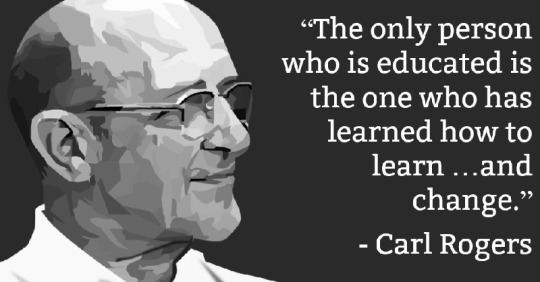
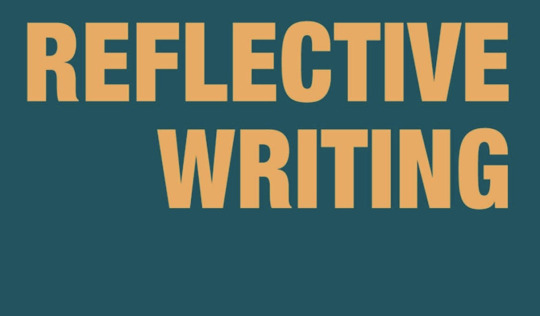
PIDP 3100 Assignment #1 - Reflective Writing Part 1
For : Karen Brooke, Vancouver Community College
Submitted by : Deepa Bhatia Dhingra
Date : June 22, 2025
This reflection is based on a powerful quote from Carl Rogers, featured in Merriam & Bierema’s Adult Learning: Linking Theory and Practice: “An educated person is one who has learned how to learn…how to adapt and change” (Merriam & Bierema, 2014, p.31).
Objective : What is this quote or idea about? What caught your attention?
This quote reshapes the idea of what it truly means to be educated. For me, it goes far beyond degrees or formal qualifications - it’s about developing the mindset and ability to keep learning, especially when the world around us keeps evolving.
It caught my attention because, in today’s world where information is abundant, it’s not just about accessing knowledge, but knowing how to make sense of it, apply it, and grow from it. Having come across a phrase of "emptying your cup” (Meda R, 2024), it’s all about learning, unlearning, and relearning and keeping a room for fresh thinking - that’s exactly what this quote reminded me of.
Reflective : Why did you choose this quote or idea? How do you identify with it?
I chose this quote because it mirrors what I’ve seen and experienced throughout my life. Having spent more than 35 years in media sales in India, I’ve worked with people from all walks of life. Time and again, I saw that those who really thrived weren’t always the ones with the highest degrees—they were the ones who were naturally curious, agile, open to feedback, and always eager to learn something new.
Since moving to Vancouver, that observation has only deepened. Whether I’m speaking with peers or watching young professionals navigate their paths, I’ve noticed that the ones who succeed are those who embrace change and have a growth mindset. It’s really inspiring to see such intrinsic motivation and a self-directed approach to learning. This fits so well with what adult learning theory tells us—especially how adults are more motivated to learn when it’s tied to real-life needs and experiences (Naji, 2022).
Personally, I treat every conversation as a learning opportunity - whether it’s with a student, a family member, or a stranger in a coffee shop. And I’ve made it a habit to explore new technologies and teaching methods. Kolb’s experiential learning theory (Mcleod, 2025) also resonates with me - learning really does happen through reflecting on experience.
Interpretive : What does it mean to you? What insights did you get from the quote or idea? How has your thinking changed by reflecting on this quote or idea?
This quote has given me a fresh lens on my role as an educator. It’s reminded me that teaching isn’t just about delivering content or transmission - it’s about creating the space for transformation. It’s a lifelong evolving mindset, a journey I must embark on for life. I keep going back to Dewey’s words: “Education is not preparation for life; education is life itself” (Education Is Life Itself | Engage2learn, n.d.). That hits home for me.
It’s changed how I think about impact. I now believe that one of the most meaningful things we can do as educators is to help students build the confidence to explore, to fail, and to try again. If we can encourage curiosity, resilience, adaptability and self-reinvention, we’re doing more than teaching—we’re instilling skills that would enable individuals to navigate life's transitions and challenges more effectively
Decisional : How can this new or enhanced interpretation be applied to your professional practice?
This reflection has made me want to be more intentional in how I support adult learners. Here’s how I plan to bring that into my practice:
Making time for reflection : This assignment itself reminded me how powerful reflection can be and I am glad I am doing it. In my previous sales roles, we’d often debrief after meetings and campaign pitches - I see now how valuable that was for growth. I want to give my students that same opportunity to pause, think, and learn from their experiences.
Focusing on the process, not just the outcome: I want to design projects that allow learners to explore, experiment, and make mistakes. I’ve started working on a framework I call “AIDE” (Artificial Intelligence for Deepened Engagement) that encourages real-world problem-solving using AI, while staying grounded in human curiosity and autonomy.
Encouraging self-directed learning : I’ve always believed in empowering people to chart their own paths. I’ll support students to identify their needs, find their own resources, and set personal learning goals. That kind of independence is incredibly motivating.
Creating a safe and encouraging environment : Adults learn best when they don’t feel judged. I want to create spaces where risk-taking is welcome, mistakes are seen as learning steps, and feedback is supportive. I remember one of my bosses telling me that if you need impact, create fearless battle grounds. Like Richardson too points out, a sense of psychological safety can make all the difference (Richardson, 2023).
Walking the talk : I’ll continue learning and upskilling myself - not just to stay current and relevant, but to model what lifelong learning looks like. I want my students to see that growth doesn’t stop, no matter your age or experience.
At the heart of it, this quote has become a touchstone for how I approach education. It’s a call to nurture knowledge managers who are curious, courageous, and ready to keep evolving - no matter where life takes them.
References
Education is Life Itself | engage2learn. (n.d.). Engage2learn.org. https://engage2learn.org/blog/2019/01/25/education-is-life-itself
Mcleod, S. (2025). Kolb’s Learning Styles and Experiential Learning Cycle. Simply Psychology. https://www.simplypsychology.org/learning-kolb.html
Meda, R. (2024, May 23). The Lifelong Benefits of Learning, Unlearning, and Relearning. MEDA Foundation. https://meda.foundation/the-lifelong-benefits-of-learning-unlearning-and-relearning/
Merriam, S. B., & Bierema, L. L. (2014). Adult Learning: Linking Theory and Practice. Jossey-Bass. https://download.e-bookshelf.de/download/0003/9722/52/L-G-0003972252-0002483324.pdf
Naji, C. (2022, October 4). The Fundamental Principles of Adult Learning. Eduflow Blog. https://www.eduflow.com/blog/adult-learning-principles
Richardson, J. (2023). Psychological Safety in Adult Learning Environments. Adult Education Quarterly.

0 notes
Text
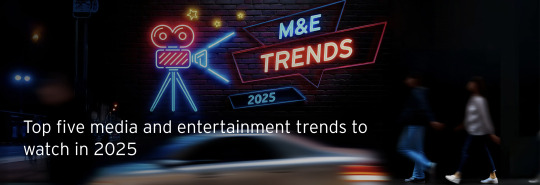
Trends in the Media and Entertainment Industry
For: Karen Brooke, Vancouver Community College Submitted by: Deepa Bhatia Dhingra
The Media and Entertainment industry is experiencing unprecedented transformation, driven by rapid technological advancements, shifting consumer behaviours, and changing cultural dynamics.
Key Emerging Trends
1. AI - Driven Content Creation Artificial Intelligence is revolutionizing how content is conceptualized and produced. From ideation to execution, creators now use AI tools to automate and enhance their workflows, making content more efficient and targeted (Copy.ai, n.d.).
2. Hyper-Personalized Streaming Streaming platforms and social media channels leverage AI algorithms to tailor content to individual users, moving away from linear programming and increasing engagement and retention (Amplyfi, 2023).
3. Immersive Media Experiences Interactive media technologies such as VR, AR, and MR are simulating real-world experiences, transforming storytelling and user interaction across industries including entertainment, education, and marketing (Number Analytics, n.d.).
4. Short-Form, Snackable Content Short videos that are quick, engaging, and highly relatable have emerged as a dominant content format, particularly for younger audiences who favour immediacy and impact (Forbes Agency Council, 2024).
5. Interactive Storytelling Audience participation is redefining narratives. Interactive videos now offer users decision points, allowing them to shape the story’s direction, which enhances emotional investment and retention (Clixie, 2024).
6. Growth of the Creator Economy The balance of power is shifting toward individual creators on platforms like TikTok and YouTube. By 2027, the creator economy is projected to near half a trillion dollars (Goldman Sachs, 2023).
7. Ethical and Cultural Awareness With increasing demand for accuracy, inclusion, and context in storytelling, the industry is moving toward more ethical and socially aware content production (University of Wisconsin-Madison, n.d.).
8. Sustainable Production Practices Companies are adopting environmentally conscious production methods to reduce carbon emissions while cutting costs and improving brand accountability (LinkedIn, 2024).
Implications for Educators
To keep pace with these trends, instructors must evolve their pedagogical strategies:
Practice-Based Learning: Emphasizing real-world simulations and experiential projects to develop practical competencies.
Curriculum Relevance: Incorporating up-to-date industry trends and technologies to ensure applicable learning outcomes.
Fostering Interdisciplinary Thinking: Integrating media, data science, ethics, psychology, and technology within learning frameworks.
Digital Ethics and Literacy: Equipping learners to identify misinformation, understand AI biases, and assess ethical content production.
Promoting Creator Autonomy: Teaching students how to build personal brands, monetize their content, and protect intellectual property.
Personal Preparation Strategy
In response to this transformation, I am undertaking the following actions:
Agile Learning: Embracing agile learning methodologies that emphasize adaptability, collaboration, and personalized learning experiences (Khan et al., 2023).
Tech Integration: Learning skills like basics of AI tools, AR/VR, video editing, podcasting, and short-form video. Getting familiar and updated with new tools relevant in media and entertainment - game development platforms like Unity and Unreal Engine; CapCut, the video editing app used for creating short-form videos for platforms like TikTok and Instagram Reels; DaVinci Resolve - a professional-level video editing and color correction software, used in film and television production.
Innovative Instructional Models: Increasing student engagement and learning outcomes by adopting flipped classrooms, project-based learning, and digital-first teaching models
Gamification and Scenario-Based Learning: Designing assignments that use branching scenarios and interactivity to boost problem-solving (Near-Life, 2024).
Continuous Learning and Networking: Following industry experts and engaging in online communities to stay current on trends and tools.
By embedding these strategies into my teaching practice, I aim to prepare learners to thrive in a media landscape that is increasingly driven by technology, creativity, and ethical accountability.
References
Amplyfi. (2023). How AI-driven content curation and creation are reshaping streaming, gaming and social platforms.
Clixie. (2024). The evolution of storytelling: How interactive videos are shaping the future. https://www.clixie.ai/blog/the-evolution-of-storytelling-how-interactive-videos-are-shaping-the-future
Copy.ai. (n.d.). AI content creation. https://www.copy.ai/blog/ai-content-creation
Forbes Agency Council. (2024, March 19). Short-form video content: Capturing attention in the digital age. https://www.forbes.com/councils/forbesagencycouncil/2024/03/19/short-form-video-content-capturing-attention-in-the-digital-age/
Goldman Sachs. (2023). The creator economy could approach half a trillion dollars by 2027. https://www.goldmansachs.com/insights/articles/the-creator-economy-could-approach-half-a-trillion-dollars-by-2027
Khan, I. A., Chugh, R., & AlHabaibeh, A. (2023). Agile learning in education: Adapting to the changing needs of students. ResearchGate. https://www.researchgate.net/publication/373397778_Agile_Learning_in_Education_Adapting_to_the_Changing_Needs_of_Students
LinkedIn. (2024). Sustainability in video production 2024. https://www.linkedin.com/pulse/sustainability-video-production-2024-storyvord-fpiwc/
Near-Life. (2024). Branching scenarios: What, why, and how. https://near-life.tech/branching-scenarios-what-why-how/
Number Analytics. (n.d.). The immersive media revolution. https://www.numberanalytics.com/blog/immersive-media-revolution
University of Wisconsin-Madison. (n.d.). Digital media ethics. https://ethics.journalism.wisc.edu/resources/digital-media-ethics
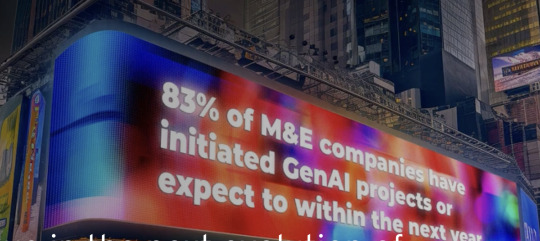
0 notes
Text
My Journey: From New Delhi to Vancouver, A Life in Media and Beyond
Deepa Bhatia
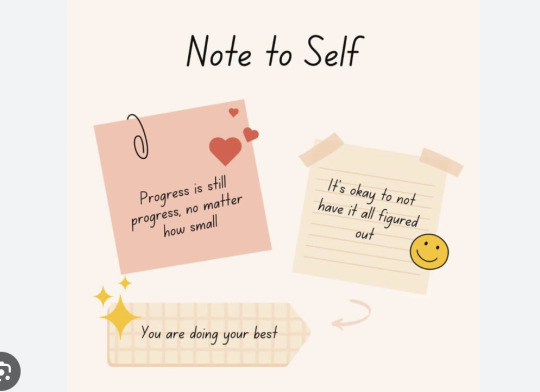
Born and raised in the vibrant chaos of New Delhi, India, I am a media and entertainment professional with a passion for building brands and embracing new challenges. Two years ago, I embarked on a bold new chapter in Vancouver, Canada, where I continue to evolve as a professional, learner, and individual.
Armed with a Master’s degree in History and a Post Graduate Diploma in Advertising and Public Relations, I dove into the dynamic world of media over three and a half decades ago. My career began at India’s largest media conglomerate, The Times of India Group, where I spent 15 years honing my craft as an advertising sales executive. My knack for understanding products, engaging in meaningful conversations, and driving sales with conviction propelled me up the corporate ladder to Chief Manager of Advertising Sales. The thrill of closing deals and the scent of success became my driving force.
Seeking new horizons, I transitioned into television, taking on leadership roles at TIMES NOW, India’s leading English news channel, as General Manager of Sales, and later as Head of Sales at 9X Media, a music channel network. At 9X, I embraced the challenge of delivering returns on investors’ capital, sharpening my strategic acumen. My four years with Walt Disney India added a global perspective, enriching my leadership skills and exposing me to world-class media practices.
Yet, a hunger for reinvention gnawed at me. Faced with the choice to stay on a familiar path or leap into the unknown, I chose the latter. I became a media-preneur, founding my own consultancy to guide media brands in crafting business strategies, launching assets, and building sustainable growth. My work now focuses on monetizing media ventures and empowering teams with effective leadership, a role that fuels my passion for problem-solving and innovation.
This journey has been anchored by the unwavering support of my husband, Ashwani, a seasoned advertising professional and digital marketer, and our son, Aaryan, a recent UBC Sauder graduate. Their encouragement has been my bedrock, especially during the daunting yet transformative move from India to Vancouver. This transition stirred a whirlwind of emotions, from navigating cultural shifts to embracing new perspectives. It has deepened my emotional intelligence, fostering resilience, self-awareness, and empathy—qualities that continue to shape my personal and professional growth.
Now, I stand at the threshold of another reinvention. Enrolling in the Provincial Instructor Diploma Program (PIDP) marks a return to my educational roots, 35 years after I last sat in a classroom. My goal is to become a skilled educator, teaching the art of effective sales while continuing to learn and solve problems. This pursuit is not just about career growth but about finding a larger purpose—one that keeps my curiosity alive and drives me to embrace steady progress.
From the bustling streets of New Delhi to the serene landscapes of Vancouver, my life has been a testament to curiosity and resilience. I am a lifelong learner, unafraid to start over, take one step at a time, and live boldly...
...for as Eleanor Roosevelt said, “Life must be lived, and curiosity kept alive.” :)
1 note
·
View note